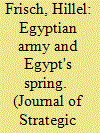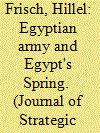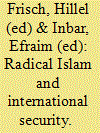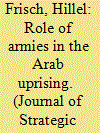| Srl | Item |
| 1 |
ID:
093895


|
|
|
|
|
| Publication |
2010.
|
| Summary/Abstract |
Israel's general elections in 2009 yielded three major outcomes: 1) the replacement of the bi-polar system that characterized Israeli electoral politics between 1977 and 2003 in which most parties are aligned to one of the two principal parties by a more flexible multi-party system. 2) The nearly total collapse of the Labor party and the Zionist left; for the first time since the 1920s, the Labor party was no longer a major political player, and 3). Kadima's electoral relative success, despite scandals haunting it since 2006. Kadima has basically superseded Labor without necessarily adopting its ideology. We argue (contrary to Henry Kissinger's quip that Israel never had a foreign policy but only a domestic policy) that primarily external factors and processes - chiefly the failure of the Oslo process in the 1990s - yielded these three outcomes.
|
|
|
|
|
|
|
|
|
|
|
|
|
|
|
|
| 2 |
ID:
090121


|
|
|
|
|
| Publication |
2009.
|
| Summary/Abstract |
The PLO, the article attempts to prove, is dead, contributing to the withering of Palestinian diaspora political life. If true, the life and death of the PLO is rife with the paradox of substantiating the most basic of Zionist claims that reterritorialization and the withering of diaspora can only be perceived as a trade-off with a deterministic end in favour of political territoriality. Palestinians face the tragedy of being divided in the territory of contestation and are farther than ever from achieving statehood, while in the near abroad and beyond they are hardly in a position to form a trans-state community.
|
|
|
|
|
|
|
|
|
|
|
|
|
|
|
|
| 3 |
ID:
057390


|
|
|
| 4 |
ID:
117829


|
|
|
| 5 |
ID:
120282


|
|
|
|
|
| Publication |
2013.
|
| Summary/Abstract |
After Mubarak's ouster, the Egyptian senior command had assumed a guardian role similar to the former Turkish model despite a shoddy performance in maintaining public order and the questionable loyalty of the lower ranked officers and the ordinary soldiers. Its relative success in managing the transition was due to the willingness of the Muslim Brotherhood and the Salafists to negotiate as stakeholders in the system rather than to battle in the streets against the Army. The Muslim Brotherhood strategy worked. In August 2012, recently elected president Morsi subordinated the military by removing the veteran Minister of Defence, the Chief-of-Staff, and other key officers. The military caved in without a whimper.
|
|
|
|
|
|
|
|
|
|
|
|
|
|
|
|
| 6 |
ID:
120294


|
|
|
|
|
| Publication |
2013.
|
| Summary/Abstract |
After Mubarak's ouster, the Egyptian senior command had assumed a guardian role similar to the former Turkish model despite a shoddy performance in maintaining public order and the questionable loyalty of the lower ranked officers and the ordinary soldiers. Its relative success in managing the transition was due to the willingness of the Muslim Brotherhood and the Salafists to negotiate as stakeholders in the system rather than to battle in the streets against the Army. The Muslim Brotherhood's strategy worked. In August 2012, recently elected President Morsi subordinated the military by removing the veteran Minister of Defense, the Chief-of-Staff, and other key officers. The military caved in without a whimper.
|
|
|
|
|
|
|
|
|
|
|
|
|
|
|
|
| 7 |
ID:
062097


|
|
|
|
|
| Publication |
Spring/Summer 2005.
|
| Description |
p391-406
|
|
|
|
|
|
|
|
|
|
|
|
|
|
|
|
| 8 |
ID:
059489


|
|
|
| 9 |
ID:
139978


|
|
|
|
|
| Publication |
Massachusetts, LexingtonBooks, 1984.
|
| Description |
xvi, 190p.: figure, tableshbk
|
| Standard Number |
0669064351
|
|
|
|
|
|
|
|
|
|
|
|
Copies: C:1/I:0,R:0,Q:0
Circulation
| Accession# | Call# | Current Location | Status | Policy | Location |
| 023221 | 956.04/SAN 023221 | Main | On Shelf | General | |
|
|
|
|
| 10 |
ID:
050115


|
|
|
| 11 |
ID:
074099


|
|
|
|
|
| Publication |
2006.
|
| Summary/Abstract |
Scholars have expressed doubts about the ability of counterterrorism to cope with suicide bombings, resulting in tit-for-tat or loop-like and repetitive violence and counter-violence without meaningful, let alone decisive results for the stronger side. Such skepticism may explain why so much of the recent literature on terrorism and insurgency is focused on the factors motivating the challenger rather than upon the insurgent's capabilities. This article demonstrates the extent to which Israeli offensive measures have reduced considerably the impact of Palestinian violence on the Israeli protagonist corroborating research that counterterrorism should adopt an offensive escalating strategy against the insurgent.
|
|
|
|
|
|
|
|
|
|
|
|
|
|
|
|
| 12 |
ID:
062429


|
|
|
| 13 |
ID:
083343


|
|
|
|
|
| Publication |
London, Routledge, 2008.
|
| Description |
viii, 218p.
|
| Series |
Middle Eastern military studies
|
| Standard Number |
9780415395328
|
|
|
|
|
|
|
|
|
|
|
|
Copies: C:1/I:0,R:0,Q:0
Circulation
| Accession# | Call# | Current Location | Status | Policy | Location |
| 053855 | 355.009569533/FRI 053855 | Main | On Shelf | General | |
|
|
|
|
| 14 |
ID:
077442


|
|
|
|
|
| Publication |
2007.
|
| Summary/Abstract |
Rule of law is usually analyzed exclusively in reference to domestic peace within the political entity. Yet, establishing a powerful independent legal system can have a major impact on peaceful relations between political entities. This article evaluates the Palestinian Authority's performance in creating democratic and legal institutions from its inception in the summer of 1994 until the outbreak of the armed conflict between Israel and the Palestinians in September 2000. Three potential explanations drawn from the literature on state formation are evaluated in explaining the outcome: the foreign intervention thesis blames the failure on the asymmetry of power between Israel and the PLO; the domestic structural claim is that the weakness of the legal system stems from the unwillingness of the ruler to limit his power; and the cultural argument claims that only Anglo-Saxon and European states are truly liberal and democratic. The findings show that the quest for power led to centralization of authority in the executive, despite valiant attempts by politicians and civil society to avert such an outcome, and the article identifies the types of obstacles that need to be overcome to transform the Palestinian entity into a democratic reality that would promote peaceful coexistence with its neighbors.
|
|
|
|
|
|
|
|
|
|
|
|
|
|
|
|
| 15 |
ID:
081019


|
|
|
|
|
| Publication |
London, Routledge, 2008.
|
| Description |
xi, 227p.
|
| Series |
BESA studies in international security
|
| Standard Number |
9780415444606
|
|
|
|
|
|
|
|
|
|
|
|
Copies: C:1/I:0,R:0,Q:0
Circulation
| Accession# | Call# | Current Location | Status | Policy | Location |
| 053169 | 320.557/FRI 053169 | Main | On Shelf | General | |
|
|
|
|
| 16 |
ID:
120281


|
|
|
|
|
| Publication |
2013.
|
| Summary/Abstract |
The following special issue on the role of armed forces focuses on what explains the considerable variation in the both how these uprisings palyed themselves out and their political outcomes.At least three basic dimensions - duration, political intensity and the magnitude of violence - the variation between the six states covered in this issue - Egypt, Syria, Libya, Tunisia, Yemen and Bahrain - has been considerable even on a proportionate basis. The range of political outcomes within these six cases has been considerable, ranging from a more or less stable transition to democracy in Tunisia to the Syrian case where there is considerable fear that Syria will break up into sectarian mini-states.
|
|
|
|
|
|
|
|
|
|
|
|
|
|
|
|
| 17 |
ID:
120293


|
|
|
|
|
| Publication |
2013.
|
| Summary/Abstract |
The following special issue on the role of armed forces focuses on what explains the considerable variation in both how these uprisings played themselves out and their political outcomes. At least three basic dimensions - duration, political intensity and the magnitude of violence - the variation Between the six states covered in this issue - Egypt, Syria, Libya, Tunisia, Yemn and Bahrain - has been considerable even on a proportionate basis. The range of political outcomes within these six cases has been considerable, ranging from a more or less stable transition to democracy in Tunisia to the Syrian case where there is considerable fear that Syria will break up into sectarian mini-states.
|
|
|
|
|
|
|
|
|
|
|
|
|
|
|
|
| 18 |
ID:
078596


|
|
|
| 19 |
ID:
093006


|
|
|
|
|
| Publication |
2009.
|
| Summary/Abstract |
Existing literature is weak in explaining strategic change among terrorist movements, especially regarding the question of why these organizations often switch between contesting the external enemy, usually the government or the occupying power, and the internal arena in which they compete against fellow rebel groups. A rebel force facing diminishing returns from a formerly successful tactic with no equally effective tactical substitute in sight is likely to switch from conflict against a government to achieve dominance in the rebel camp. The terrorist movement will switch from the external to the internal arena even if such substitution compromises the overall goals of the rebel camp. The following article explores these dynamics in Hamas's strategy in the latest round of conflict between the movement and Israel.
|
|
|
|
|
|
|
|
|
|
|
|
|
|
|
|
| 20 |
ID:
101740


|
|
|
|
|
| Publication |
2011.
|
| Summary/Abstract |
Why have absolutist monarchies in the past three decades survived when so many succumbed to coups and revolution in the past? The rulers' use of divide-and-rule and balancing strategies as Lust-Okar and Jamal noted recently, served as a partial solution. Overlooked in the literature on the persistance of monarchies was how these mechanisms, which reduce the leader's domestic vulnerability, mar his offensive capabilities to cope with centralising, more effective and threatening neighbours. To cope with this trade-off between internal and external vulnerabilities, monarchs and leaders of other Third World states have been involved in a two-level game of 'omnibalancing' - allying with strong outside powers when possible while continuing to employ divide-and-rule and balancing techniques domestically. Only resource-rich or strategically located monarchies can enjoy such protection which is why most of monarchies that have persisted are located in the Middle East.
|
|
|
|
|
|
|
|
|
|
|
|
|
|
|
|